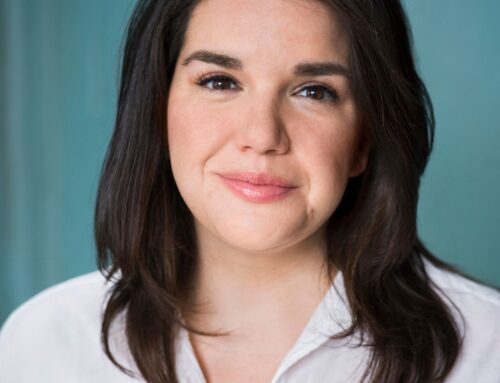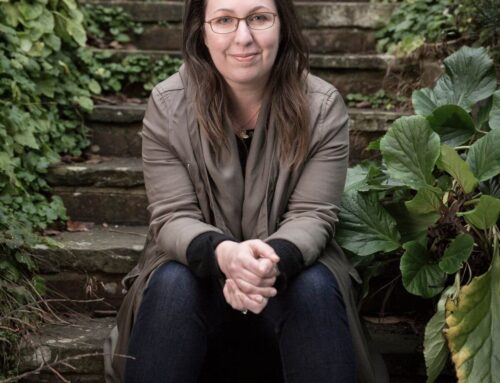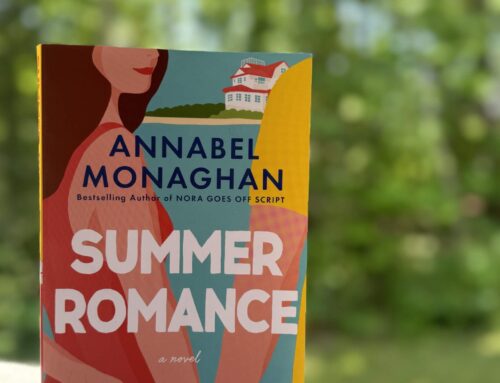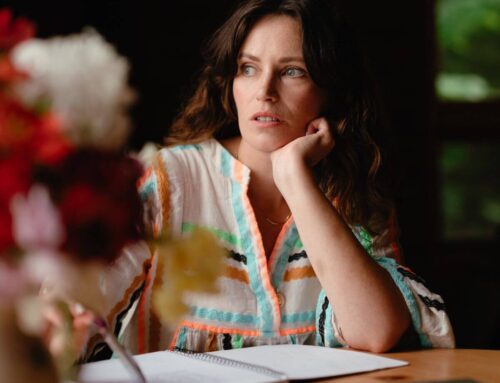K. X. Song is a diaspora writer with roots in Hong Kong and Shanghai. Raised between cultures and languages, she enjoys telling stories that touch on collective memory, translation, and the shifting nature of memory and history. She is the author of An Echo in the City and her latest release, The Night Ends with Fire, her adult fantasy debut. She currently resides in the San Francisco Bay Area.

The Night Ends with Fire by K. X. Song
The Night Ends with Fire is a fantasy adventure inspired by the legend of Mulan. Meilin defies her father’s plan to sell her for her dowry by disguising herself as a boy and joining the army in his place. Her dedication earns her recognition and the friendship of Sky, a prince. As war threatens the Three Kingdoms, Meilin encounters a sea dragon spirit offering power at a deadly cost. She must decide who she will trust—Sky, the dragon spirit, or an enemy prince—as she grapples with her destiny and the future of her kingdom.
Buy the book now: Bookshop.org | Amazon | Barnes & Noble
Tell us about what inspired The Night Ends With Fire.
I first starting writing this book during the pandemic in 2021. After finishing a contemporary novel about more serious topics, I wanted to write something fun, fantastical, and full of adventure. Something that readers could immerse themselves in.
At the same time, the story of Mulan, especially after the recent Disney live-action remake, caught my attention. Disney’s version turns Mulan into a virtuous girl driven by filial piety and selfless compassion, but I wondered about the real woman behind the legend—her flaws and humanity.
Lastly, I love the intrigue and clever dialogue in the Romance of the Three Kingdoms. The epic timelines and dramatic consequences left a lasting impression on me, and I wanted to write something just as intense and dramatic.
How did you decide to move into adult fantasy after your contemporary YA debut?
I actually wrote speculative fiction before my contemporary YA debut. Growing up, I was a huge fan of fantasy novels, and writing The Night Ends With Fire felt like coming back to that sense of wonder and awe I craved as a kid. Especially when the world feels like a depressing place, I find a sense of escapism in fantasy novels, and I was seeking that feeling in writing The Night Ends with Fire.
This book is described as a Mulan-inspired story. What made you choose this as inspiration?
The different versions of Mulan’s story throughout history intrigued me. For example, the 1998 Disney version, where Mulan is celebrated by the emperor and reunited happily with her family, is very different from the 1695 Chinese version, where she faces a tragic end. Even though Mulan is often seen as a symbol of gender equality, her stories usually reinforce traditional roles. I wanted to explore what would happen if Mulan, after experiencing freedom disguised as a man, refused to go back to those constraints. How would society react to her challenging those norms?
With Fourth Wing being one of the biggest recent books and House of Dragon having a huge following as well, it feels like dragons are definitely having a moment. What do you love about this subgenre of fantasy? And how does your book fit into the landscape?
Dragons are fascinating because they appear across so many different cultures and time periods. In Chinese culture, they’re seen as intelligent and powerful beings. During the year of the dragon in the Chinese zodiac, the birth rates even spike because Chinese people want “dragon babies.” In my book, I wanted to create morally complex dragons that aren’t just background props, but rather, are characters in their own right with complex motives and hidden agendas.
What are some of your favorite recent adult fantasy reads?
I loved The Green Bone Saga by Fonda Lee for its detailed worldbuilding, family dynamics, and complex plot. Daughter of the Moon Goddess by Sue Lynn Tan is also a favorite for its epic romance, beautiful setting, and the protagonist’s internal growth, which is wonderfully done.
What are some of the cultural influences or historical inclusions that readers can expect from this book?
The Night Ends With Fire is inspired by both the Ballad of Mulan and the Romance of the Three Kingdoms, a 14th-century Chinese classic. Liu Sky, the main character in the book, is based on Liu Bei, an upstanding and noble man who always strives to do the right thing. I was particularly drawn to the contrast in Romance of the Three Kingdoms between Liu Bei, a virtuous, classic hero archetype, and his rival warlord Cao Cao, who is more of an antihero. While Liu Bei is noble, Cao Cao is self-serving, pragmatic, and cunning. His actions are driven by personal gain, yet his sharp intelligence and personal moral code earn him respect even from his enemies. Readers might find a character in my novel who reminds them of Cao Cao.
What are some of the themes and dynamics you’re exploring with this novel?
Great question! There is a quote in the novel that illustrates Meilin’s culture:
“The Tian word for slave is made of two characters: girl and hand. For the girl is the slave, and the hand is the means with which she serves.”
Due to this upbringing, Meilin learns from a young age that her ambition is a depravity, something not meant to exist in the hearts of women, who are raised to serve. Meilin treats her desire for power as a sign of corruption and tries to smother it, hiding it even from herself. However, she isn’t entirely successful, and her actions in the war are often driven by this inner hunger or “greed,” as she calls it. Through Meilin, I wanted to explore the strained relationship women can have with ambition and the cost of acquiring power.
What did you enjoy about switching to an adult genre? What elements were challenging?
I was surprised by how similar the writing process was for both young adult and adult. For both projects, I started with a seed of an idea, that then grew through character development. I would say the main challenge for The Night Ends with Fire was in the limited point of view; I could only show the world through Meilin’s perspective. There was a lot I enjoyed about writing adult; I loved not being restricted by the word count and being able to write a longer story, and I also appreciated being able to explore darker themes in the plot. I still love both YA and adult; and find myself switching back and forth depending on the season.







Leave A Comment